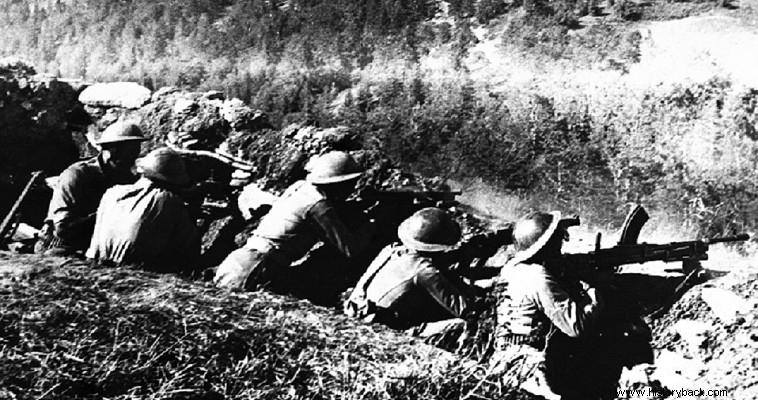
The situation at the beginning of 1947 appeared confusing for the reborn Greek Army, which was still in its "childhood". The guerilla war that started in Litochoro in 1946 did not find him ready for war in any way. Guerrilla groups of the later Democratic Army of Greece (DSE) acted without substantial pressure from the adversary, unleashing blows as they saw fit in place and time.
In the area of Kantsikos (Drosopigi Konitsis) the groups of Petritis and Nemertsikas had been located since December 1946, while there was also information about the arrival of the group of Giannoulis. The 3rd Company of the 527th Infantry Battalion (TP) of the 43rd Brigade (TX) of the VIII Infantry Division (MP) had, since February 1947, been deployed on the heights of Roupa and Panagia near the village, as there was information about an imminent rebel attack.
On March 3 men of the company located two men who had been charged by the rebels to carry a message to the company. The message was to soldiers whom the rebels were calling to surrender or join the "people's fighters". From these two men the company was informed that an attack was imminent on the 4th or 5th of March.
The company informed the 527th TP which reinforced it with a platoon, while also informing the 43rd TK. However, the 4th and 5th of March passed without the slightest incident. Thus, on the evening of March 6, the company launched a platoon force patrol, under the reserve lieutenant Hatzigiannakis, towards Fourka. The patrol in question did not encounter an enemy and in the early hours of March 7th it started its return journey. Also, just in case, the company had set up an ambush on a small bridge near the Panagia hill.
The attack
At 05.15 in the morning of March 7 the three groups of rebels (Petriti, Nemertsika, Giannouli), with a strength of 500-700 men, equipped with an Italian mortar, 10 machine guns and several machine guns, attacked the positions of the men of the company , which had three platoons of riflemen – the patrol had not yet returned – no machine guns and a British 3in mortar. The insurgents had established a base of fire and intended to attack from the north and south against the positions of the 3rd Company.
However, they fell into the ambush that the company had set up and the battle began. Thus the advantage of surprise was lost for them. The battle was now on for good. Despite the pressure of multiple insurgents, the company held on. With his signal he also informed the battalion which decided to reinforce him with a platoon reinforced with a mortar element and with the 2nd Company, minus a platoon. However, the aid did not manage to be promoted, in the end, in time. Only the Hatzigiannaki patrol managed to return and reinforce the 3rd Company. The Air Force also declared its inability to intervene.
So the company continued to fight alone surrounded by the rebels. Around 09.30 Hatzigiannakis and his men managed to break the line of rebels and join the company. In the meantime, the rebels managed, after a fierce struggle, to occupy the Panagia hill and temporarily the Rupa hill. From the latter, however, they were driven out by a heroic counterattack by the men of that platoon. The rebels continued to press the company throughout the day, seeing no Army reinforcements coming.
But finally, unable to break the defense of the 3rd Company, they began to withdraw from 16.00 in the afternoon. The 3rd Company alone had defeated opponents at least five times their size and better armed. His losses were significant – 4 dead, 12 wounded, 7 missing. The losses of the rebels were heavier. Thirteen of their dead were found on the field, and their wounded were many more – they were estimated at 45. The rebels, as was their custom, took their other dead and wounded with them. The victors also captured an enemy machine gun, a sub-machine gun and six rifles and machine guns.
The conflict in question was one of hundreds of similar ones that took place during the guerrilla war. What makes it special is the fact that both his commander and 35 of his soldiers were treated as "communists" and "ready to join their like-minded people in case of offense". How far the service fell on him was shown in the battle.
